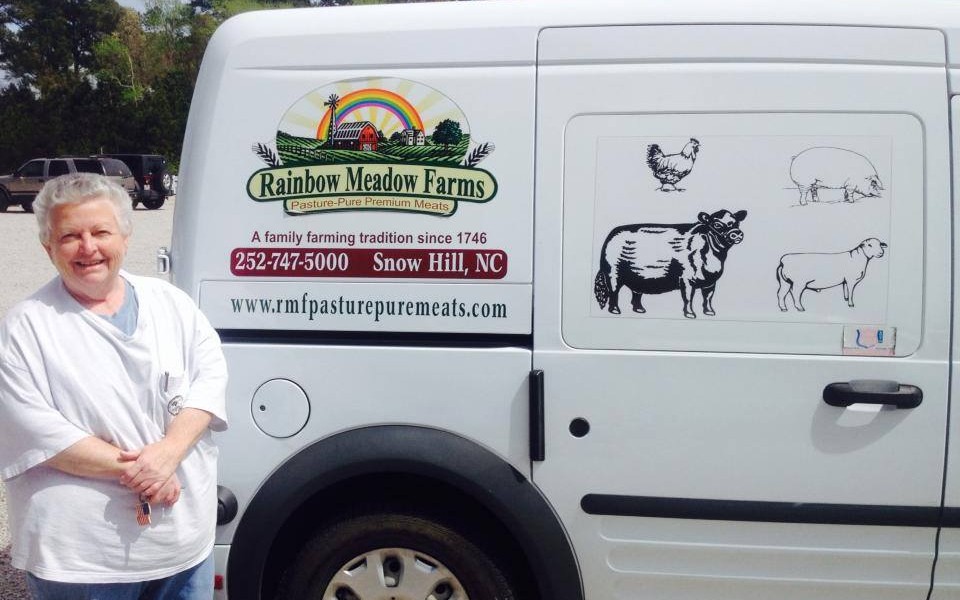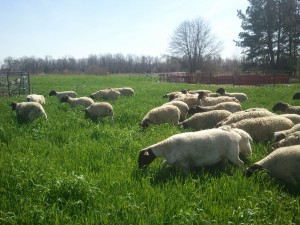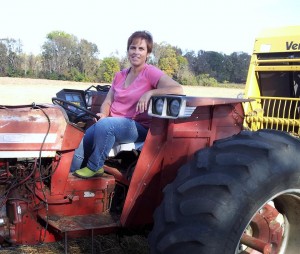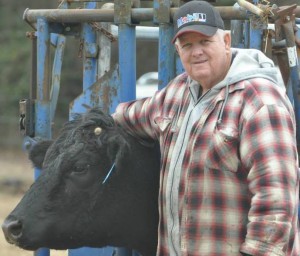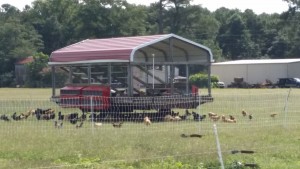It doesn’t always take an army to stand up to the big guys — in Sandra Garner’s case, she’s doing it by selling one package of meat at a time.
Rainbow Meadow Farms, Sandra’s family operation that includes ten generations of her family, once grew tobacco and contract poultry for steady income from large companies. As these companies began putting profits before people, the Garners found themselves out of work and wondering how they would keep their land and provide for themselves. With determination and willingness to take some risks, Sandra started selling her own pasture-raised meats in the face of $100,000 of debt.
Sandra’s family began farming their land in 1746, when her ancestors received a land grant from the King of England. In the 1800s, her great grandfather became one of the first tobacco farmers in the county, setting their family apart in history and starting a precedent of farming tobacco as a viable, dependable crop. But as the programs that made tobacco a strong farm income generator ended, tobacco’s profit margin began to decline and Sandra started looking for other ways to pay the bills.
“We had to do something. We knew that corn and wheat and beans would not support us or support the farm as far as paying taxes and keeping it viable. We had an opportunity to go into contract poultry at that time, and we decided to do that,” said Sandra.
For a time, contract poultry brought security back to the farm. The Garners signed up with Perdue in 1985 and invested in two chicken houses, relieved to receive a paycheck every eight weeks as they cared for chickens on their historic family land. Starting out as a contract poultry grower required a big investment, but Sandra expected to earn that back and more as her family continued to grow chickens for Perdue.
But in 2003, Perdue cut ties with Garner and others in the area without warning. The company decided to close the processing plant in Robersonville, North Carolina, and open a new one in Lewiston, North Carolina, a location much further from Sandra’s farm. Her supervisor showed up on her front yard one day unannounced, termination contract in hand.
“We were devastated. We didn’t know what to do. We didn’t have any idea that this was going to take place,” said Sandra.
After a year of stress and financial uncertainty, Case Farms, another poultry contractor based in Goldsboro, North Carolina, decided to take on the displaced poultry growers in the northeastern part of the state. The Garners thought they had found a solution by signing with Case, but more expenses lay hidden between the lines of the new contract, setting their family back again.
Case Farms required their poultry growers to build new chicken houses or retrofit existing ones to meet specific standards. The Garners invested more than $100,000 to meet these qualifications and continue to grow contract poultry. Then, two years later, Case Farms let them go before they had earned nearly enough to pay for the investment.
As an eighth generation farmer, Sandra felt an obligation to her heritage and her 300 acres of land. Even in the most uncertain financial times, she knew she wouldn’t stop working her land.
“We don’t have an option of selling it. Our life would be much easier if we could sell it and sit back rocking in a rocking chair. We don’t have that option. It’s been in our family for so many years,” said Sandra.
That’s when Sandra’s daughter, Genell Pridgen, suggested pasture poultry as an alternative that her parents consider.
“You’ve got to constantly be forward thinking,” said Genell, who works as a consultant for the Socially Responsible Agriculture Project.
It took some convincing and adjusting, but Genell was able to get her parents on board to raise pasture poultry as independent farmers. The change meant her family was now responsible for raising, distributing and marketing their chickens, dedicating more hours each day and producing less poultry than they had under contract to Perdue or Case.
“There’s never really a break. It’s much more in-depth, more labor intensive. It requires more work, but it’s really rewarding,” said Genell, who left behind her career in biology to return to the farm alongside her mother and father, determined to preserve their family’s heritage for future generations.
The family is not just committed to the economic sustainability of the farm, but to the land itself. Now, Rainbow Meadow Farms raises pastured pork, lamb, beef, chicken, turkey and eggs, and instead of being confined, the livestock rotationally graze about 300 acres of native grasses and small grain pastures. The animals thrive on nutrient-rich, chemical-free pastures, enriched by the organic compost generated on the farm.
“We didn’t put out commercial fertilizers, we didn’t spray pesticides and we didn’t put out any weed killers. All of that was a big change we had to learn to adapt to,” said Sandra. “We decided to go that way, and it just paid off very well for us.”
Sandra now spends her weekends at the farmers market, talking to her customers and marketing her products directly. Selling her own products brings a lot of expense and little security, but Sandra loves meeting her customers face-to-face and sharing experiences with them.
“It’s a joy to meet new people coming to the market who don’t know what you have — who don’t even know how to grow these animals – and tell them about what’s happening on the farm,” said Sandra. “I probably won’t ever retire, I just love it so much. I love meeting the people. I love listening to them. I love seeing them excited about what they’re buying.”
Further Reading
- Learn more about Sandra and Rainbow Meadow Farms on their website.
- For more information on the sorry state of the contract poultry industry in the U.S. and its affect on family farmers like Sandra, read this Ask Farm Aid column.
- Read “A New Farm Economy Rises from Tobacco’s Ashes” to learn more about North Carolina’s long history of tobacco growing, how that market crashed, and how resourceful farmers have made the transition to growing healthy food.
- To find food from family farmers like Sandra in your area, check out our Find Good Food page.
